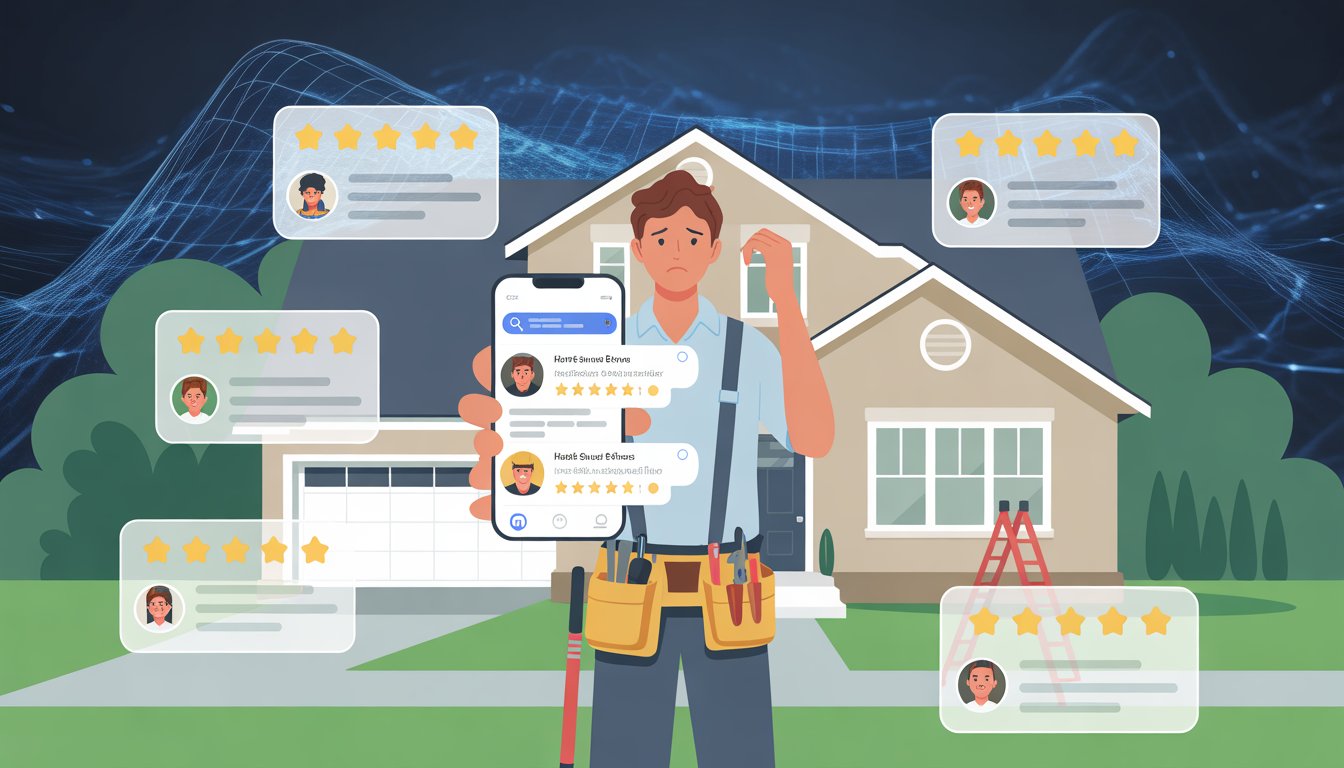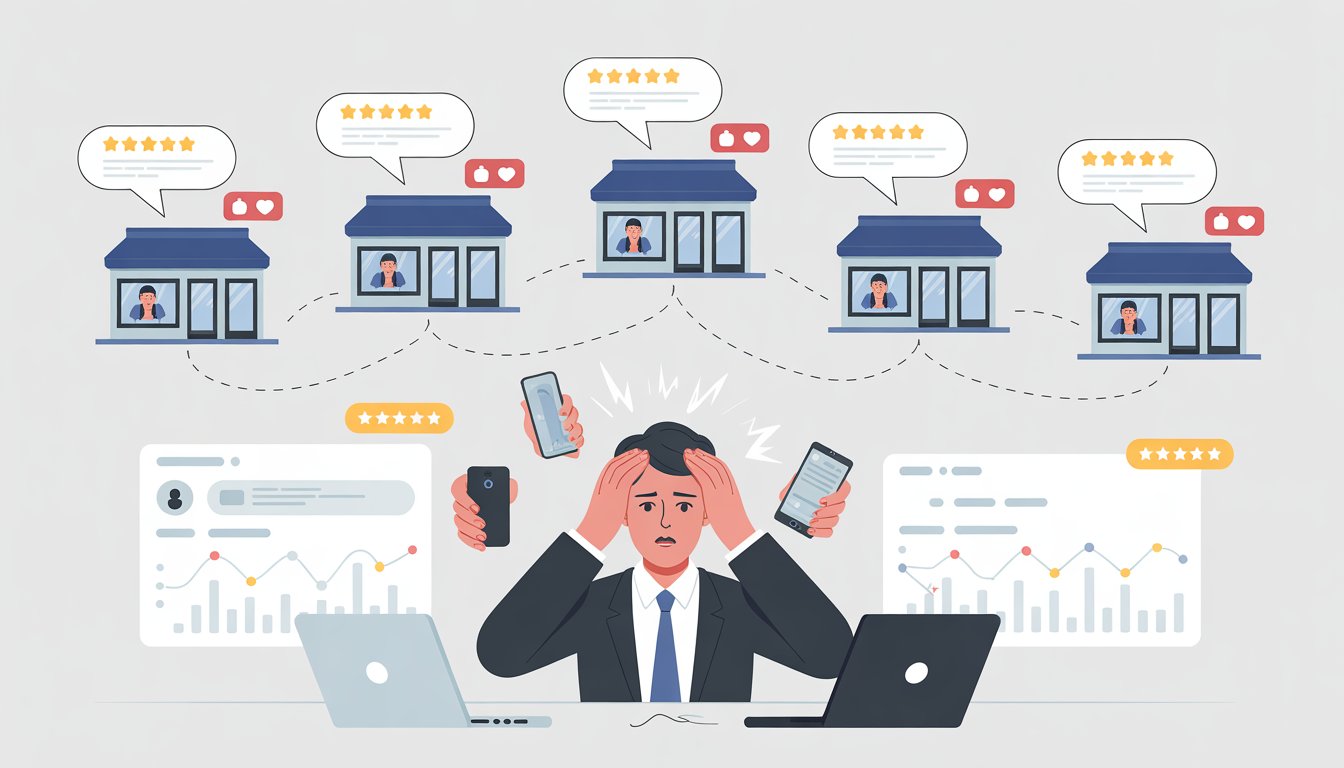Home service businesses face a unique challenge in the digital world. Unlike retail stores or restaurants, your customers invite you into their homes for expensive, complex services.
This creates perfect conditions for fake review scams to thrive.

Home service companies struggle more with fake reviews because they handle high-value transactions, work in private settings, and often deal with customers during stressful situations, making them prime targets for review extortion and fraudulent feedback. Your business might complete hundreds of successful jobs, but a few fake negative reviews can destroy years of reputation building.
The problem gets worse when you consider that home service work is hard to verify online. A fake reviewer can easily claim you damaged their property or provided poor service.
Other customers reading these reviews have no way to check if the complaints are real, making your business vulnerable to both competitor attacks and extortion schemes.
Key Takeaways
- Home service businesses are targeted more because they handle expensive, private work that's difficult to verify online
- Fake negative reviews can destroy your reputation quickly since potential customers can't easily fact-check service claims
- Review extortion schemes specifically target home service companies due to their vulnerability and high transaction values
The Extent and Forms of Fake Reviews in Home Services

Fake reviews targeting home service businesses take multiple forms, from purchased positive reviews to malicious negative review campaigns. Small home service companies face unique vulnerabilities due to their limited review volume and high dependence on local reputation.
Types of Fake Reviews: Positive vs Negative
Fake positive reviews are purchased by businesses to boost their ratings artificially. Home service companies often buy these reviews to compete with established competitors who have more genuine reviews.
These positive fakes typically cost between $5-25 per review. They usually contain generic language like "great service" without specific details about the actual work performed.
Fake negative reviews work differently and cause more immediate damage. Scammers post one-star reviews to extort money from businesses.
They demand payment ranging from $100-500 to remove the fake reviews. Recent scams target moving companies, roofing contractors, and repair services with elaborate fake stories.
These reviews claim specific problems like damaged property or poor workmanship that never happened. Negative fakes spread faster than positive ones.
A single fake negative review can drop your rating significantly when you only have 10-20 total reviews.
Typical Targets: Why Small Businesses Are Vulnerable
Small home service businesses make perfect targets for fake review schemes. You likely have fewer than 50 total reviews, making each fake review more impactful on your overall rating.
Most targeted business types include:
- Moving companies
- Roofing contractors
- HVAC repair services
- Plumbing companies
- Landscaping services
Your business phone numbers are publicly listed, making you easy to contact on WhatsApp or text. Scammers use these numbers to threaten fake negative reviews unless you pay.
Small businesses also lack the resources to fight fake reviews effectively. You can't hire reputation management companies or legal teams like larger corporations can.
Your customer base relies heavily on Google Maps and online reviews to choose services. This dependency makes the threat of fake negative reviews more serious for your business survival.
Role of Review Brokers and Online Platforms
Review brokers operate organized fake review businesses from overseas locations like Pakistan and Bangladesh. They charge $100 for packages of 20 fake reviews and target multiple businesses simultaneously.
These brokers use artificial intelligence tools to create realistic-sounding fake reviews at scale. They can produce hundreds of fake reviews daily across different industries and locations.
Google removes hundreds of millions of fake reviews yearly but many still slip through. The platform offers limited direct support for small businesses dealing with fake review attacks.
Common broker tactics include:
- Using multiple fake accounts to post reviews
- Targeting the same businesses across different time periods
- Creating elaborate fake scenarios in negative reviews
- Demanding payments through untraceable methods
Review brokers often contact you before posting fake negatives, claiming someone "ordered" reviews against your business. This creates fear and urgency to make you more likely to pay their demands.
Unique Challenges for Home Service Businesses

Home service companies face distinct problems with fake reviews that other businesses don't experience. Their heavy reliance on customer feedback and local reputation makes them prime targets for review scams.
High Dependence on Customer Reviews
Your business lives or dies by online reviews. Unlike retail stores or restaurants, customers can't easily judge your plumbing or HVAC work before hiring you.
Most people choose home service companies based on Google Maps ratings and customer testimonials. A single fake one-star review can drop your rating from 4.8 to 4.5 stars.
This rating drop costs you real money. Studies show customers skip businesses with ratings below 4.0 stars.
Your phone stops ringing when fake reviews hurt your score. Small businesses in home services often have fewer total reviews than big companies.
One fake negative review has more impact when you only have 20 reviews instead of 200. You can't show your work quality through photos like restaurants can with food.
Customers must trust reviews to make hiring decisions.
Localized Competition and Trust Factors
You compete in a small geographic area where reputation matters more. Bad reviews spread faster in local communities through word of mouth.
Local search results on Google Maps directly affect your business. Fake reviews push you down in rankings when people search for "plumber near me" or "HVAC repair."
Your competitors often work in the same neighborhoods. A fake review attack can send customers straight to your competition across town.
Trust takes years to build in home services. You're entering people's homes and handling expensive repairs.
Fake negative reviews destroy that trust instantly. Many customers search for contractors only when they have emergencies.
They pick the first company with good reviews and don't research further.
Lack of Direct Support from Platforms
Google Maps and review platforms offer little help when fake reviews hit your business. Their automated systems struggle to detect sophisticated review scams.
Removing fake reviews takes weeks or months through official channels. Your business suffers damage while you wait for platform responses.
Small businesses don't have dedicated account managers like big corporations do. You're stuck with generic customer support that doesn't understand your urgent needs.
Review platforms prioritize keeping reviews up rather than taking them down. They worry more about appearing unbiased than protecting legitimate businesses from scams.
The appeals process requires technical evidence that most home service owners can't provide. You need IP addresses and detailed proof that platforms rarely accept.
The Impact of Fake Reviews on Business Reputation
Fake reviews create serious problems for home service businesses by damaging customer trust and affecting sales. Both fake negative and positive reviews harm your business in different ways and can lead to lasting financial losses.
Damaging Effects of Fake Negative Reviews
Fake negative reviews can destroy your business reputation quickly. When competitors post false bad reviews, your star rating drops fast.
This makes potential customers choose other companies instead. Your business can lose up to 25% of its revenue from fake negative reviews.
These reviews hurt your online reputation on Google Maps and other platforms. Customers trust online reviews when picking home service companies.
Fake negative reviews are hard to remove once posted. You might spend weeks trying to get Google to delete them.
During this time, customers keep seeing the false information about your business. Some scammers target home service businesses with fake review schemes.
They post bad reviews and then ask for money to remove them. Many businesses pay hundreds of dollars to stop these attacks.
Consequences of Deceptive Positive Reviews
Fake positive reviews create false trust with customers. When you buy fake good reviews, customers expect better service than you can provide.
This leads to real negative reviews later. Using fake positive reviews can get your business in trouble.
Google can remove all your reviews or ban your business listing. This penalty hurts more than having fewer reviews.
Fake positive reviews make competition unfair. Honest businesses lose customers to companies with fake high ratings.
This damages the whole industry's reputation over time. Customers are getting better at spotting fake positive reviews.
When they find them, they lose trust in your business completely. This creates worse problems than having no reviews at all.
Long-Term Trust and Revenue Loss
Reputation management becomes much harder after fake review problems. Your business loses credibility that takes years to rebuild.
New customers doubt your real positive reviews too. Lost sales add up quickly from damaged reputation.
Home service businesses depend on local trust and word-of-mouth referrals. Fake review problems hurt both of these income sources.
Your business faces ongoing costs from fake review damage. You spend money on reputation repair instead of growing your company.
You also lose high-value repeat customers who stop trusting you. Recovery from fake review damage takes significant time and effort.
You need many real positive reviews to fix your reputation. This process can take months or years to complete successfully.
Scams, Extortion, and Modern Tactics Targeting Home Services
Home service businesses face increasingly sophisticated fake review schemes that use automated tools and coordinated attacks. Scammers now demand hundreds of dollars by threatening negative reviews or posting fake ones first, then charging for removal.
Extortion Through Fake Negative Reviews
Fraudsters send messages to business owners claiming they will post fake negative reviews unless paid. They often demand between $100 to $150 per business.
The scam works in two ways. First, scammers threaten to flood your Google Maps listing with fake one-star reviews.
Second, they post fake negative reviews first, then contact you demanding payment for removal. Common extortion tactics include:
- WhatsApp messages from overseas phone numbers
- Text messages claiming "someone hired me to post bad reviews"
- Demands for payment through untraceable methods
- Threats to post 10-20 negative reviews at once
Moving companies, roofers, and appliance repair services get targeted most often. These businesses rely heavily on star ratings to attract customers.
Once scammers receive payment, they often return with more demands. Some businesses report paying multiple times to different scammers for the same fake reviews.
Use of AI and Automation by Scammers
Scammers now use automated tools to create fake reviews faster than ever before. AI helps them write realistic-sounding negative reviews that are harder to detect.
Review brokers use software to manage hundreds of fake accounts across multiple platforms. These accounts look real with profile pictures and review histories.
Automated systems can post dozens of fake reviews within minutes. This speed makes it nearly impossible for businesses to respond before damage occurs.
Modern automation includes:
- AI-generated review content
- Fake account creation tools
- Automated posting schedules
- Multiple platform targeting
The technology lets scammers operate from anywhere in the world. Many extortion attempts come from overseas phone numbers in Pakistan, Bangladesh, and other countries.
Coordinated Attacks and Review Manipulation
Some fake review schemes involve coordinated attacks from multiple accounts. These attacks create patterns that look like real customer complaints.
Scammers time their fake reviews to cause maximum damage. They often post during busy seasons when businesses need good ratings most.
Coordinated attack methods:
- Multiple accounts posting within hours
- Similar complaint themes across reviews
- Targeting specific service areas
- Following up with extortion demands
Review manipulation goes beyond single fake reviews. Scammers create networks of fake accounts that support each other's reviews.
Fake Review Watch and similar services track these coordinated efforts. They help businesses identify patterns that prove reviews are fake rather than from real customers.
Online Review Platform Responsibilities and Limitations
Review platforms face complex challenges when it comes to moderating fake reviews, especially for home service businesses. Google Maps struggles with verification gaps, while legal protections limit platform accountability and recent regulatory efforts have shown mixed results.
Google Maps and Platform Moderation Gaps
Google Maps removed 170 million policy-violating reviews in 2023, yet fake reviews still make up about 10.7% of all reviews on the platform. This creates serious problems for home service businesses.
The platform struggles to verify if reviewers actually used the services they're reviewing. Unlike product purchases, home services don't leave clear digital purchase trails.
Key moderation challenges include:
- No way to confirm service completion
- Difficulty tracking one-time customer interactions
- Limited ability to verify reviewer identity
Google's automated systems can't easily detect when someone writes a fake review about a plumber or electrician they never hired. This leaves home service businesses more exposed to fake negative reviews from competitors.
The platform also struggles with AI-generated reviews, which have grown 80% month-over-month since June 2023. These reviews look realistic but describe services that never happened.
Legal Protections for Review Platforms
Section 230 of the Communications Decency Act protects platforms from liability for user-generated content. This means you can't easily sue Google or other platforms for hosting fake reviews about your business.
Platforms act as intermediaries, not publishers of the content. They have no legal duty to verify every review's accuracy before publishing it.
Current legal framework:
- Platforms aren't liable for fake reviews
- Limited obligation to remove reported content
- No requirement for identity verification
This protection system made sense for early internet growth. But it now shields platforms from taking stronger action against fake reviews that hurt home service businesses.
The burden falls on business owners to prove reviews are fake and request removal. Even then, platforms can choose whether or not to act on your reports.
Recent Regulatory Efforts and Their Shortcomings
The FTC sent warnings to over 700 businesses about fake reviews in 2021, threatening fines up to $43,792 per violation. But enforcement remains limited and focused mainly on businesses, not platforms.
Proposed FTC rules would ban buying fake reviews and require disclosure of AI-generated content. However, these rules don't force platforms to improve their detection systems.
Current regulatory gaps:
- No mandatory verification requirements
- Limited platform accountability measures
- Slow enforcement against violators
The Coalition for Trusted Reviews formed in 2023 with major platforms like Google and Yelp. But this voluntary effort lacks binding standards or deadlines for improvement.
Home service businesses still wait months for fake review removal. Meanwhile, the damage to their reputation and customer trust continues to grow.
Strategies for Home Service Businesses to Combat Fake Reviews
Home service companies need specific tactics to identify fraudulent reviews early and build strong defense systems. Creating authentic customer relationships and using trusted voices helps protect your business reputation.
Spotting and Reporting False Reviews
Watch for these warning signs in reviews that suggest they're fake:
- Multiple reviews posted within days from new accounts
- Generic complaints that lack specific details about your service
- Reviews mentioning services you don't offer
- Similar writing patterns or phrases across different reviews
Check reviewer profiles for red flags. Real customers usually have review history and profile photos.
Fake accounts often have no other reviews or generic usernames. Report suspicious reviews immediately to Google, Yelp, and other platforms.
Most sites have specific forms for reporting false content. Keep detailed records of fake reviews including screenshots and dates.
Document patterns you notice. If multiple fake reviews appear quickly, this suggests organized attacks.
Platforms are more likely to remove reviews when you show clear evidence of coordinated fake activity. Remove your phone number from public business listings if scammers contact you directly.
This simple step can stop extortion attempts through WhatsApp or text messages.
Building Resilient Reputation Management Systems
Set up automated monitoring tools to track new reviews across all platforms daily. Free Google Alerts can notify you when your business name appears online.
Paid tools offer more detailed tracking. Create a response strategy for handling fake reviews while they're under review.
Post professional replies that focus on facts without getting defensive. This shows potential customers you're responsive and professional.
Encourage genuine customers to leave reviews immediately after service completion. Send follow-up texts or emails with direct links to review platforms.
Real reviews from happy customers dilute the impact of fake ones. Build multiple review sources.
Don't rely only on Google reviews. Ask customers to review you on Yelp, Facebook, and industry-specific sites.
This spreads your reputation across platforms. Train your team to ask for reviews from satisfied customers.
Give them simple scripts and make review requests part of your standard service process.
Leveraging Influencers and Authentic Feedback
Partner with local influencers who genuinely use home services. Micro-influencers with 1,000-10,000 followers often have more engaged audiences than bigger accounts.
Their authentic recommendations carry more weight. Work with satisfied customers who have strong social media presence.
Offer small discounts for sharing their experience on their personal accounts. Real customer posts look more authentic than paid ads.
Create customer spotlight programs where you feature real customers and their projects. Ask permission to share before-and-after photos with their reviews.
This builds trust and encourages others to share. Partner with complementary businesses in your area.
Real estate agents, interior designers, and contractors can refer customers and provide authentic testimonials about your work. Use video testimonials when possible.
These are much harder to fake and create stronger connections with potential customers. Short videos work well on social media and your website.
Frequently Asked Questions
Fake reviews create unique problems for home service businesses, affecting consumer trust and reputation management.
These businesses face specific challenges when dealing with fake reviews and need targeted strategies to protect their online presence.
What impact do fake reviews have on consumer trust in home service businesses?
Fake reviews cause serious trust problems for home service businesses. Consumer trust in online reviews dropped from 79% in 2020 to just 42% in 2025.
When customers lose trust in reviews, they become more cautious about hiring service providers. This hurts all businesses in your industry, even honest ones.
Home service customers need high trust levels because they invite strangers into their homes. Fake reviews make this decision much harder.
Your potential customers now check multiple review platforms before making contact. They look for detailed, authentic experiences rather than just star ratings.
How can home service businesses identify and handle fake reviews effectively?
You can spot fake reviews by looking for certain warning signs. Generic language without specific details about your services is a red flag.
Reviews posted in clusters on the same day often indicate fake activity. Real customers usually leave reviews over time.
Check if the reviewer mentions specific staff members or project details. Fake reviews rarely include these authentic touches.
When you find fake reviews, report them to the platform immediately. Most sites like Google and Yelp have reporting systems for suspicious content.
Keep detailed records of your actual customers and projects. This helps you prove which reviews are legitimate when platforms investigate.
What legal actions can home service businesses take against fake reviews?
You can pursue legal action against competitors who post fake negative reviews about your business. This falls under defamation and business interference laws.
Document everything carefully before taking legal action. Save screenshots, gather evidence, and track the source if possible.
Contact a lawyer who specializes in online reputation cases. They can help you understand your options and the strength of your case.
Some states have specific laws against fake review manipulation. These laws make it easier to take action against dishonest competitors.
Consider sending cease and desist letters first. This approach often resolves the problem without expensive court battles.
Why might fake reviews pose a greater challenge to home service businesses compared to other sectors?
Home service businesses face higher stakes because customers invite you into their personal spaces. Trust becomes much more important than with other purchases.
Your services often involve significant money and time investments. Customers research more carefully before making these big decisions.
Many home service purchases happen infrequently. Customers lack experience choosing contractors, making them rely more heavily on reviews.
You typically serve local markets where reputation spreads quickly. A few fake negative reviews can damage your standing in the entire community.
Your work results are highly visible and personal. Fake reviews can unfairly influence decisions about projects that affect people's daily lives.
What role do online platforms play in mitigating the spread of fake reviews for home service businesses?
Online platforms use automated systems to detect suspicious review patterns. These systems flag reviews posted in unusual clusters or from fake accounts.
Google and other major platforms have invested in better verification methods. They now require more proof that reviewers actually used your services.
Many platforms now show additional context about reviewers. This helps customers judge whether reviews come from verified customers.
Platforms respond faster to reports of fake reviews than in previous years. Most major sites investigate reports within a few days.
Some platforms use artificial intelligence to identify fake content. These systems get better at spotting suspicious reviews over time.
How should home service businesses respond to fake reviews to maintain their reputation?
Never respond emotionally to fake negative reviews. Stay professional and factual in all your responses.
Point out factual errors without being defensive. State simple facts about your business practices or policies.
Focus your response on potential customers reading the review. Show them you handle criticism professionally.
Encourage real customers to share their experiences. Authentic positive reviews help balance fake negative ones.
Consider mentioning that you keep detailed records of all customers and projects. This subtly suggests the review might not be genuine.
Report fake reviews to the platform while also responding publicly. This protects your reputation while working toward removal.










